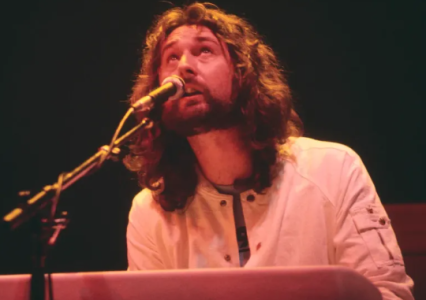A sad goodbye to Supertramp’s founding member Rick Davies, gone at 81—fans stunned as cause of death revealed
- Replies 0
The world of classic rock is mourning the loss of a true musical architect. Rick Davies, the soulful voice, pianist, and co-founder of the legendary British band Supertramp, has passed away at the age of 81.
For many, his songs became the soundtrack of their youth, carrying memories of long drives, first loves, and the questions of growing up.
His passing leaves behind not only a deep musical legacy but also a reminder of how powerful music can be in shaping our lives.
Born in Swindon, England, in 1944, Rick Davies’ journey to rock stardom was anything but ordinary. Before Supertramp, Davies honed his craft in the British blues scene, playing with bands like The Joint and The Lonely Ones.
But it was in 1970, when he placed a simple ad in Melody Maker magazine seeking musicians for a new project, that fate intervened. Enter Roger Hodgson, and the seeds of Supertramp were sown.
Together, Davies and Hodgson recruited Dougie Thomson, Bob Siebenberg, and John Helliwell, forming the classic Supertramp lineup that would define a generation.
Their chemistry was undeniable, blending Davies’ bluesy, grounded style with Hodgson’s ethereal, melodic sensibilities. The result? A sound that was both sophisticated and accessible, quirky yet heartfelt.
Davies’ mastery of the Wurlitzer electric piano became the band’s signature, weaving through hits like "Goodbye Stranger," "Give a Little Bit," and "Take the Long Way Home."
His vocals, sometimes gritty, sometimes tender, always authentic, gave life to lyrics that explored everything from existential angst to the joys and absurdities of modern life.
Their 1979 album Breakfast in America was a cultural phenomenon, earning four Grammy nominations and going diamond in Canada. Songs like "The Logical Song" and "Breakfast in America" became anthems, not just for their catchy melodies, but for their clever, introspective lyrics.
Davies’ songwriting partnership with Hodgson was the engine behind this success, each pushing the other to new creative heights.
Like many great bands, Supertramp’s story wasn’t without its share of drama. After a decade of chart-topping albums and sold-out tours, creative differences began to surface.
In 1983, Roger Hodgson left the band, marking the end of an era. But Davies, ever the steady hand, kept Supertramp alive, guiding the group through new albums and tours, and ensuring their music continued to resonate with fans old and new.
Their final studio album, Slow Motion, was released in 2002, capping off a remarkable run that spanned more than three decades.
Even as the music industry changed, Supertramp’s influence endured, their songs finding new life in movies, commercials, and the playlists of younger generations.
Also read: Remembering Randy Boone: The singing cowboy who brought heart to the small screen
In 2015, just as Supertramp was preparing for a highly anticipated 25-date European reunion tour, Davies received a devastating diagnosis: multiple myeloma, a rare and aggressive form of blood cancer.
The tour was cancelled, and Davies shifted his focus to treatment and spending time with his beloved wife, Sue, with whom he shared over fifty years of marriage.
Despite his illness, Davies remained a source of inspiration for fans and fellow musicians alike. His resilience, humor, and passion for music never wavered, even as he faced the toughest battle of his life.
Supertramp’s surviving members paid tribute to Davies in a heartfelt statement, remembering him as "the voice and pianist behind Supertramp’s most iconic songs, leaving an indelible mark on rock music history."
They quoted his own lyrics from "Goodbye Stranger": “Goodbye stranger it’s been nice / Hope you find your paradise.”
It’s a fitting farewell for a man whose music helped so many of us find a little paradise of our own, if only for the length of a song.
Read next: Famed Mastodon guitarist gone too soon at 51—how did he die so unexpectedly?

Were you a Supertramp fan back in the day? Do you have a favorite Rick Davies song or concert memory? How did his music touch your life?
For many, his songs became the soundtrack of their youth, carrying memories of long drives, first loves, and the questions of growing up.
His passing leaves behind not only a deep musical legacy but also a reminder of how powerful music can be in shaping our lives.
Born in Swindon, England, in 1944, Rick Davies’ journey to rock stardom was anything but ordinary. Before Supertramp, Davies honed his craft in the British blues scene, playing with bands like The Joint and The Lonely Ones.
But it was in 1970, when he placed a simple ad in Melody Maker magazine seeking musicians for a new project, that fate intervened. Enter Roger Hodgson, and the seeds of Supertramp were sown.
Together, Davies and Hodgson recruited Dougie Thomson, Bob Siebenberg, and John Helliwell, forming the classic Supertramp lineup that would define a generation.
Their chemistry was undeniable, blending Davies’ bluesy, grounded style with Hodgson’s ethereal, melodic sensibilities. The result? A sound that was both sophisticated and accessible, quirky yet heartfelt.
Davies’ mastery of the Wurlitzer electric piano became the band’s signature, weaving through hits like "Goodbye Stranger," "Give a Little Bit," and "Take the Long Way Home."
His vocals, sometimes gritty, sometimes tender, always authentic, gave life to lyrics that explored everything from existential angst to the joys and absurdities of modern life.
Their 1979 album Breakfast in America was a cultural phenomenon, earning four Grammy nominations and going diamond in Canada. Songs like "The Logical Song" and "Breakfast in America" became anthems, not just for their catchy melodies, but for their clever, introspective lyrics.
Davies’ songwriting partnership with Hodgson was the engine behind this success, each pushing the other to new creative heights.
Like many great bands, Supertramp’s story wasn’t without its share of drama. After a decade of chart-topping albums and sold-out tours, creative differences began to surface.
In 1983, Roger Hodgson left the band, marking the end of an era. But Davies, ever the steady hand, kept Supertramp alive, guiding the group through new albums and tours, and ensuring their music continued to resonate with fans old and new.
Their final studio album, Slow Motion, was released in 2002, capping off a remarkable run that spanned more than three decades.
Even as the music industry changed, Supertramp’s influence endured, their songs finding new life in movies, commercials, and the playlists of younger generations.
Also read: Remembering Randy Boone: The singing cowboy who brought heart to the small screen
In 2015, just as Supertramp was preparing for a highly anticipated 25-date European reunion tour, Davies received a devastating diagnosis: multiple myeloma, a rare and aggressive form of blood cancer.
The tour was cancelled, and Davies shifted his focus to treatment and spending time with his beloved wife, Sue, with whom he shared over fifty years of marriage.
Despite his illness, Davies remained a source of inspiration for fans and fellow musicians alike. His resilience, humor, and passion for music never wavered, even as he faced the toughest battle of his life.
Supertramp’s surviving members paid tribute to Davies in a heartfelt statement, remembering him as "the voice and pianist behind Supertramp’s most iconic songs, leaving an indelible mark on rock music history."
They quoted his own lyrics from "Goodbye Stranger": “Goodbye stranger it’s been nice / Hope you find your paradise.”
It’s a fitting farewell for a man whose music helped so many of us find a little paradise of our own, if only for the length of a song.
Read next: Famed Mastodon guitarist gone too soon at 51—how did he die so unexpectedly?
Key Takeaways
- Rick Davies, founding member of British rock band Supertramp, has died at the age of 81 after a lengthy battle with multiple myeloma, a form of blood cancer.
- Davies co-founded Supertramp in 1970 with Roger Hodgson, serving as pianist, singer and co-writer on many of the band's biggest hits such as "Goodbye Stranger," "The Logical Song," and "Breakfast in America."
- The band paid tribute to Davies in a heartfelt statement, acknowledging his lasting impact on rock music and offering condolences to his wife, Sue Davies.
- Supertramp achieved global success with several hit albums and singles, but began to fall apart after 1982’s "Famous Last Words," with Davies remaining until the band’s final album in 2002; he was diagnosed with cancer in 2015.







